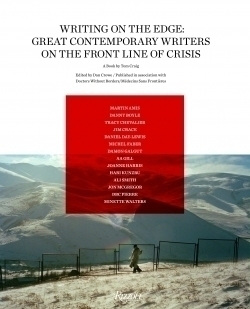Writing on the Edge
Great Contemporary Writers on the Front Line of Crisis
- 2010 INDIES Winner
- Silver, Writing (Adult Nonfiction)
In his disturbingly perceptive poem, “Musée des Beaux Arts,” W.H. Auden delineated the perpetual disconnect that exists between the comfortable, workaday world and the monumental suffering that’s always going on at its margins. He illustrates this point by citing the Pieter Bruegel painting Landscape with the Fall of Icarus, observing:
…how everything turns away
Quite leisurely from the disaster; the ploughman may
Have heard the splash, the forsaken cry,
But for him it was not an important failure; the sun shone
As it had to on the white legs disappearing into the green
Water; and the expensive delicate ship that must have seen
Something amazing, a boy falling out of the sky,
Had somewhere to get to and sailed calmly on.
So it is with the stories and photos here which take the reader into some of the world’s most persistent agony zones, specifically Armenia, Assam, Burundi, Cambodia, Chad, Cali (Colombia), Congo-Brazzaville, Morocco, Palestine, Sierra Leone, Sudan-Nuba, Uganda, the Ukraine, and Uzbekistan. In addition to sharing the common denominator of massive misery, these wretched locales also share the good—if inadequate—fortune of being served by Doctors Without Borders/Médecins sans Frontièrs, the international medical relief agency that sponsored this book.
To compile this panorama of suffering, photographer Tom Craig took with him some of the world’s most eloquent writers and asked each to put into words the specific situations his photos could only hint at. Novelist Martin Amis chronicles the relentless gang violence in Colombia, where bullet-wounded children matter-of-factly parade their visible scars while trying as best they can to cope with their invisible ones. Actor Daniel Day-Lewis introduces an endearingly normal but Israeli-beleaguered family in Gaza, where safety is an unimaginable concept and daily living a series of arbitrarily imposed indignities.
Academy Award-winning producer and director Danny Boyle journeys to the town of Muynak in northern Uzbekistan to describe how a once-prosperous fishing center was turned into a desert, thus edging its citizens into desperate poverty and illness (particularly a tenacious and deadly form of tuberculosis). Ali Smith, the novelist and short story writer, ranges through refugee camps in Morocco, reporting on the plight of immigrants from sub-Saharan Africa who persistently risk their lives—and too often lose them—in their attempts to find political asylum and/or jobs in Europe. Wherever the focus shifts—whether to the malaria and landmines infesting Cambodia, the epidemic of rapes in Burundi or the AIDS-ravaged regions of the Ukraine—there are two reliably bright spots: the worthiness of the victims and the unwavering determination of Doctors Without Borders to lessen their suffering. Too often, though, the work seems Sisyphean.
The other reporters/essayists here are Tracy Chevalier, Jim Crace, Michel Faber, Damon Galgut, A.A. Gill, Joanne Harris, Hari Kunzru, Jon McGregor, DBC Pierre, and Minette Walters.
Craig’s 100 color photographs are both riveting and heartbreaking: A doctor and her nurses working in thick, gray, floor-length coats because their clinic has no heat; an old man reduced to taut skin and sharp bones, yet still retaining enormous dignity; a little girl, raped when she was five, using carved wooden figures to describe her ordeal; a naked boy running past the rubbish dump on which he and his family subsist; the sand-encrusted head of a donkey that apparently died of thirst; the indifferent, faraway stare of a woman who has just given birth to a child that is almost certain to die; a young assassin, motivated by revenge, sprawled shirtless on a hospital bed, his revolver beside him; a legless man, his head down, sitting on a mattress on the floor, framed by his artificial limbs; a mother and her two young sons standing in front of their bullet-pocked home; a row of seated women, all still obviously in shock, with bandages covering the wounds where their upper lips were severed.
Even though every report here cites the work of Doctors Without Borders, this is by no means a blatant fund-raiser or recruiting tool for that organization. The spotlight is always on the downtrodden. In the end, the book suggests, the only sure victory is in the trying, in not turning away.
Reviewed by
Edward Morris
Disclosure: This article is not an endorsement, but a review. The publisher of this book provided free copies of the book to have their book reviewed by a professional reviewer. No fee was paid by the publisher for this review. Foreword Reviews only recommends books that we love. Foreword Magazine, Inc. is disclosing this in accordance with the Federal Trade Commission’s 16 CFR, Part 255.

